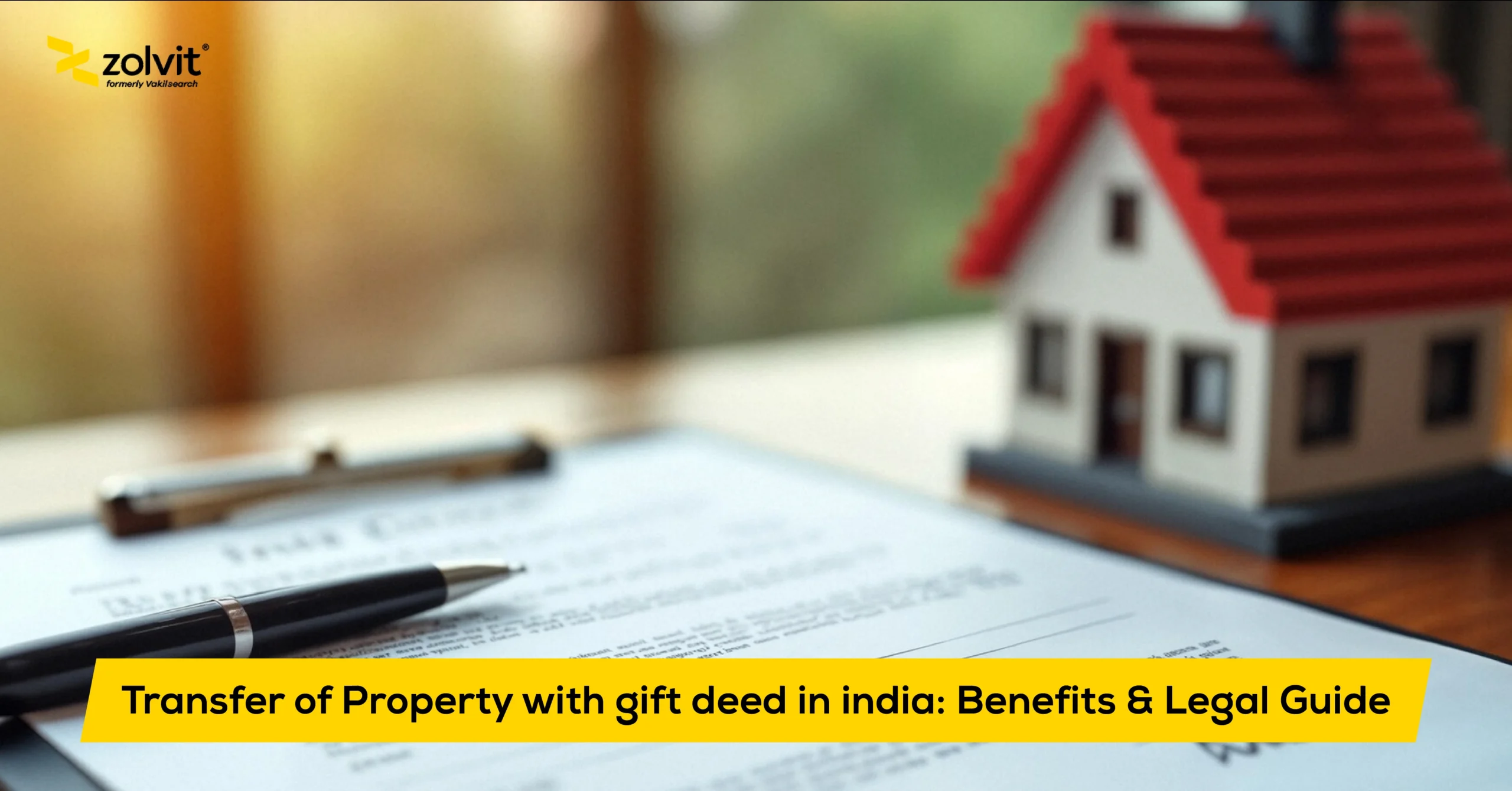Transferring property within a family is a common practice in India. A gift deed is one of the most preferred ways, wherein the owner (donor) transfers property to a family member (donee) without any consideration or monetary exchange. Thus, while transferring ownership, this method minimises the legal hassle. Let us look into how this process works, the prerequisites in law, and the advantages of executing a gift deed for property transfer.
What is a Gift Deed?
A gift deed is a legal document that allows property ownership to be transferred between individuals without requiring monetary exchange. A transfer is only deemed legitimate if it is made willingly, free from compulsion, and accepted by the receiver while the donor is still alive. It is legally binding after registration and acts as proof of transfer.
Steps to Transfer Property via Gift Deed
Transferring property through a gift deed involves a series of steps that must be followed to ensure the legality of the process. Here are the five steps to follow:
Step 1: Drafting the Gift Deed
The first step is to draft the gift deed, which must include:
-
- The full name, age, residence, and relationship of the donee and donor.
- Description of the property being gifted (size, location, and ownership details).
- Declaration that there will be no payment and that the move is entirely voluntary.
- Statement confirming that the donee accepts the gift.
- Signatures of the donor and donee in the presence of two witnesses.
Step 2: The Donee’s Acceptance
The donee must accept the gift while the donor is still alive for the gift deed to be deemed legitimate.
Step 3: Stamp Duty Payment
Stamp duty, which varies from state to state, is a substantial part of property transfers. The quantity depends on the relationship between the giver and the donee. Transfers to family members typically incur less stamp duty than transfers to non-related individuals. Here are a few instances:
-
- Delhi: 5% for joint ownership, 6% for male receivers, and 4% for female recipients.
- Karnataka: 3% for properties under Rs. 45 lakhs, 2% for those between Rs. 45 and Rs. 90 lakhs, and 5% for that amount.
- Uttar Pradesh: Rs. 5,000 for family transfers and 7% for others.
Step 4: Registration of the Gift Deed
The gift deed must be registered with the sub-registrar to ensure that the transfer is legitimate. During the registration process, the parties involved, i.e. the donee and the donor, with two witnesses, must be present. The transfer becomes enforceable as soon as the sub-registrar records the transaction and checks the papers.
Step 5: Mutation of Property Records
Upon recordation of the gift deed, it is the duty of the donee to apply for property mutation for updating the municipal records. This allows the new owner to pay property taxes in their name formally and ensures the transfer of title in government records.
Documents Required for Gift Deed
Submission of specific documentation is necessary for the registration process. Among these are:
- Deed of gift (properly signed by witnesses and both parties)
- Verification of identity (donor and donee passports, PAN cards, or Aadhaar cards)
- Verification of property ownership (sale or title deeds, or any supporting documentation)
- The encumbrance certificate is used to make sure there are no legal issues with the property.
- NOC (No-Objection Certificate), if any
- Receipts for recent property taxes
Tax Implications of Property Transfer via Gift Deed
Taxes have a significant influence on real estate transactions, so understanding their effects is essential. Section 56(2) of the Income Tax Act of 1961 exempts property received as a gift from certain relatives (parents, children, siblings, etc.) from taxation. If the property is a gift from a non-relative, the recipient may be obliged to pay taxes on its market value.
Benefits of Using a Gift Deed for Family Property Transfers
When it comes to transferring property inside a family, a gift deed has various benefits. Among the main advantages are:
- No Monetary Exchange: Guarantees a seamless transfer devoid of monetary exchanges.
- Reduced Stamp Duty: When transferring property inside the family, gift deeds carry a lower stamp duty than a sale deed.
- Immediate Ownership Transfer: A gift deed guarantees immediate ownership, as contrast to inheritance, which transfers property after the person passes away.
- Prevents Legal Conflicts: Family conflicts are reduced because the transfer is registered and documented.
Other Methods of Property Transfer Within a Family
While a gift deed is a popular method, there are alternative ways to transfer property within a family. These include:
- Will or Inheritance: Property is transferred upon the owner’s death as per the will or intestate succession laws.
- Partition Deed: Used when joint owners want to divide property among themselves.
- Relinquishment Deed: When one legal heir wishes to give up their share in favour of another heir.
- Sale Deed: Property can be transferred by executing a sale deed, even among family members, though it involves monetary consideration.
Role of a Property Lawyer in Gift Deed Transactions
A property lawyer plays a crucial role in ensuring that a gift deed transaction is legally sound and hassle-free. They help in:
- Drafting a Legally Valid Gift Deed: A deed lawyer ensures that the document complies with legal requirements and contains all necessary details.
- Verifying Ownership and Encumbrances: They check property records to confirm the donor’s ownership and ensure there are no legal disputes or encumbrances.
- Advising on Stamp Duty and Tax Implications: A title deed lawyer helps determine the applicable stamp duty and advises on tax liabilities.
- Facilitating the Registration Process: They guide both parties through the registration process at the sub-registrar’s office.
- Handling Disputes or Legal Issues: If any disputes arise, a title deed lawyer provides legal solutions to resolve them efficiently.
Case Study: Family Property Transfer with Legal Help
A client had helped pay for a piece of land in the family, expecting to get a share in return. But when it was time to transfer the ownership, an elder uncle raised objections. This caused confusion and tension, even though the client wasn’t asking for money back—just what was promised.
Not sure how to proceed, the client reached out to us. After understanding the situation, our lawyer suggested using a gift deed. It was the simplest way to transfer the property legally without needing approval from every family member. The process involved drafting the deed, paying the stamp duty, getting it registered, and updating the records. Within two weeks, the transfer was complete, and the land was officially in the client’s name. Despite the objections, the legal route worked smoothly—and gave the client both clarity and peace of mind.
How Zolvit Can Help
Zolvit streamlines the sometimes complicated legal procedures associated with property transfers. To ensure a smooth transfer, our staff offers professional help with the drafting, evaluating, and registration of gift deeds. Using Zolvit, you receive:
- Legal Advice: Making sure that state rules and regulations are followed.
- Document Preparation: Creating precise and legally sound gift deeds.
- Support for Registration: Helping to register the deed at the sub-registrar’s office.
- Tax Consultation: Assisting you in comprehending how property transfers affect your taxes.
You can easily transfer property within your family while making sure all legal procedures are fulfilled by selecting Zolvit.
Conclusion
Transferring property by way of a gift deed is the simplest and the most tax-efficient and legally correct way to transfer property in a family from one person to another. This way, ownership gets transferred free from hassles and safeguards both parties. Yet, it is always good to consult a Zolvit legal professional to ensure compliance with state laws and prevent possible legal hurdles.
FAQs Related to Gift Deed for Property Transfer
Is there a time limit to accept a property gift after the deed is made?
Yes, the donee must accept the gift while the donor is still alive. If the donee refuses or does not accept it during the donor’s lifetime, the gift is considered invalid.
Do I have to pay stamp duty if I transfer property to my spouse or children?
Yes, but the stamp duty is typically lower for family transfers compared to regular property sales. The exact percentage depends on the state where the property is located.
What happens if a gift deed is not registered?
An unregistered gift deed has no legal validity and cannot be used as proof of ownership. The donee cannot claim legal rights over the property without registration.
Can a minor receive property through a gift deed?
Yes, a minor can be a donee, but a legal guardian must accept the gift on their behalf. The minor will take full ownership when they turn 18.
Is a No-Objection Certificate (NOC) always required for a gift deed?
No, an NOC is not always mandatory, but if the property is mortgaged or belongs to a housing society, obtaining an NOC from the lender or society may be required.
How long does it take to complete the gift deed registration process?
The timeline varies by state, but once all documents are ready, the registration process at the sub-registrar’s office usually takes one to two days.
Can siblings challenge a registered gift deed in court?
Yes, siblings or other legal heirs can challenge a gift deed if they can prove that it was executed under coercion, fraud, or undue influence. However, if it was voluntarily signed and properly registered, it is legally binding.
Will the donee need to pay capital gains tax if they sell the gifted property later?
Yes, if the donee sells the property in the future, they must pay capital gains tax based on the property's market value from the date the donor acquired it, not from the date of the gift transfer.




